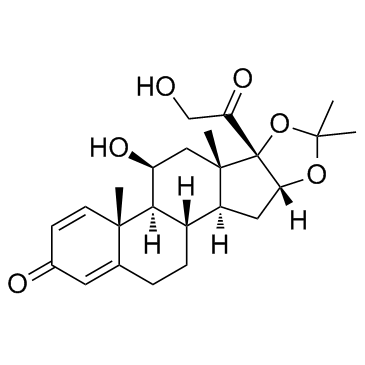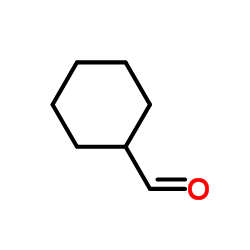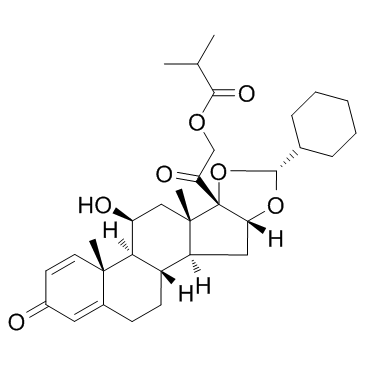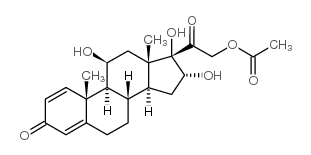Desisobutyryl-ciclesonide
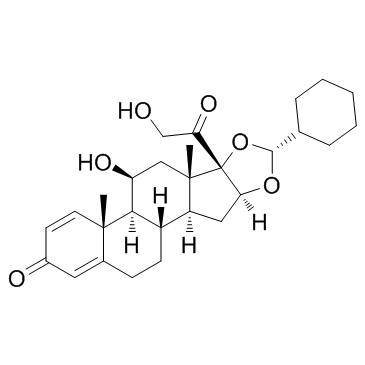
Desisobutyryl-ciclesonide structure
|
Common Name | Desisobutyryl-ciclesonide | ||
|---|---|---|---|---|
| CAS Number | 161115-59-9 | Molecular Weight | 470.59800 | |
| Density | 1.284g/cm3 | Boiling Point | 640.778ºC at 760 mmHg | |
| Molecular Formula | C28H38O6 | Melting Point | 129-132ºC | |
| MSDS | N/A | Flash Point | 211.522ºC | |
Use of Desisobutyryl-ciclesonideDesisobutyryl-ciclesonide is the active metabolite of Ciclesonide. Desisobutyryl-ciclesonide has affinity for the glucocorticoid receptor. |
| Name | Desisobutyrylciclesonide |
|---|---|
| Synonym | More Synonyms |
| Description | Desisobutyryl-ciclesonide is the active metabolite of Ciclesonide. Desisobutyryl-ciclesonide has affinity for the glucocorticoid receptor. |
|---|---|
| Related Catalog | |
| Target |
Glucocorticoid receptor[1] |
| In Vitro | Ciclesonide, an inhaled corticosteroid with almost no affinity for the glucocorticoid receptor, is highly effective in downregulating in vitro pro-inflammatory activities of airway parenchymal cells when converted into the active metabolite Desisobutyryl-ciclesonide. Peripheral blood mononuclear cell proliferation to C. albicans is dose-dependently inhibited by 0.3-3.0 μM Ciclesonide and Desisobutyryl-ciclesonide but inhibition by Desisobutyryl-ciclesonide is higher. A significant proliferation to PhlP5 is observed only in cultures from atopic subjects: an effective downregulation is already detected at 0.03 μM Ciclesonide and 0.003 μM Desisobutyryl-ciclesonide (complete inhibition at 3 μM Ciclesonide and 0.03 μM Desisobutyryl-ciclesonide). 3 μM Ciclesonide and Desisobutyryl-ciclesonide reduce the PhlP5-specific T-cell blast proliferation and interleukin 4-producing cell proportion. In PBMCs cultures from atopic patients, both Ciclesonide (CIC) and Desisobutyryl-ciclesonide (des-CIC) induce a dose-dependent downregulation of PhlP5-induced proliferation. The effect is already significantat 0.03 μM Ciclesonide and at 0.003 μM Desisobutyryl-ciclesonide (p<0.001, each comparison),with an early complete inhibition observed at 3μM Ciclesonide and at 0.03 μM Desisobutyryl-ciclesonide. The inhibitory activity toward PhlP5-induced PBMC proliferation is higher for Desisobutyryl-ciclesonide than for Ciclesonide at 0.003 μM (p<0.05), 0.03 μM (p<0.001) and 0.3 μM (p<0.05)[1]. |
| Cell Assay | Peripheral blood mononuclear cells are isolated from non atopic and atopic asthmatic children sensitized to Phleum pratense (PhlP5). Proliferation toward Candida albicans or PhlP5 in the presence of Ciclesonide or Desisobutyryl-ciclesonide (0.003-3.0 μM) is evaluated as [3H]thymidine incorporation. Modulation of PhlP5-specific T-cell blasts proliferation and PhlP5-induced interleukin 4 expression by Ciclesonide and Desisobutyryl-ciclesonide are measured[1]. |
| References |
| Density | 1.284g/cm3 |
|---|---|
| Boiling Point | 640.778ºC at 760 mmHg |
| Melting Point | 129-132ºC |
| Molecular Formula | C28H38O6 |
| Molecular Weight | 470.59800 |
| Flash Point | 211.522ºC |
| Exact Mass | 470.26700 |
| PSA | 93.06000 |
| LogP | 3.49700 |
| InChIKey | OXPLANUPKBHPMS-ZXBNPROVSA-N |
| SMILES | CC12C=CC(=O)C=C1CCC1C2C(O)CC2(C)C1CC1OC(C3CCCCC3)OC12C(=O)CO |
| Storage condition | -20°C Freezer |
|
~60% 
Desisobutyryl-c... CAS#:161115-59-9 |
| Literature: CORUS PHARMA, INC. Patent: WO2006/138212 A1, 2006 ; Location in patent: Page/Page column 42-43 ; |
|
~99% 
Desisobutyryl-c... CAS#:161115-59-9 |
| Literature: MIKASA SEIYAKU CO., LTD. Patent: US2012/59158 A1, 2012 ; Location in patent: Page/Page column 3 ; |
|
~% 
Desisobutyryl-c... CAS#:161115-59-9 |
| Literature: WO2005/63777 A1, ; Page/Page column 18; 49 ; |
|
~% 
Desisobutyryl-c... CAS#:161115-59-9 |
| Literature: WO2009/112557 A2, ; Page/Page column 6; 7 ; |
|
~% 
Desisobutyryl-c... CAS#:161115-59-9 |
| Literature: EP2392584 A1, ; |
|
~% 
Desisobutyryl-c... CAS#:161115-59-9 |
| Literature: EP2392584 A1, ; |
| desisobutyryl-ciclesonide |
| Des-CIC |
| Ciclesonide active principle |
| B-9207-021 |
| CIC-AP |
| Ciclesonide impurity B |
